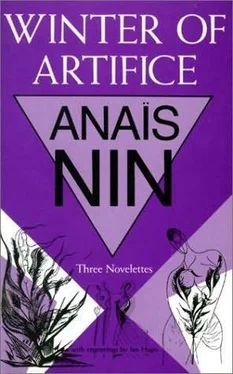Anaïs Nin - The Winter of Artifice
Здесь есть возможность читать онлайн «Anaïs Nin - The Winter of Artifice» весь текст электронной книги совершенно бесплатно (целиком полную версию без сокращений). В некоторых случаях можно слушать аудио, скачать через торрент в формате fb2 и присутствует краткое содержание. Год выпуска: 2007, Издательство: Sky Blue Press, Жанр: Классическая проза, на английском языке. Описание произведения, (предисловие) а так же отзывы посетителей доступны на портале библиотеки ЛибКат.
- Название:The Winter of Artifice
- Автор:
- Издательство:Sky Blue Press
- Жанр:
- Год:2007
- ISBN:нет данных
- Рейтинг книги:4 / 5. Голосов: 1
-
Избранное:Добавить в избранное
- Отзывы:
-
Ваша оценка:
- 80
- 1
- 2
- 3
- 4
- 5
The Winter of Artifice: краткое содержание, описание и аннотация
Предлагаем к чтению аннотацию, описание, краткое содержание или предисловие (зависит от того, что написал сам автор книги «The Winter of Artifice»). Если вы не нашли необходимую информацию о книге — напишите в комментариях, мы постараемся отыскать её.
“A handful of perfectly fold fables, and prose which is so daringly elaborate, so accurately timed… using words as magnificently colorful, evocative and imagist as any plastic combination on canvas but as mysteriously idiosyncratic as any abstract.”
—
The Winter of Artifice — читать онлайн бесплатно полную книгу (весь текст) целиком
Ниже представлен текст книги, разбитый по страницам. Система сохранения места последней прочитанной страницы, позволяет с удобством читать онлайн бесплатно книгу «The Winter of Artifice», без необходимости каждый раз заново искать на чём Вы остановились. Поставьте закладку, и сможете в любой момент перейти на страницу, на которой закончили чтение.
Интервал:
Закладка:
“The Voice,” the last novella, concerns an analyst who treats his patients conscientiously and sometimes effectively. These include Lillian, a violinist who thinks herself a lesbian; Mischa, a cellist with a stiff hand and a bad leg; and Georgia, an orchestra conductor who feels uncomfortable with her womanhood because of her father’s amorous adventures when she was young. Most importantly, the Voice treats Djuna and Lilith, the narrators of the first two novellas. All these characters, including the Voice, have significant emotional problems.
“The Voice” does not answer the question implied at the conclusion of “Djuna”: will Johanna leave Hans? Whatever Johanna’s decision, in “The Voice” Djuna and Hans remain together in some manner, though this is a minor issue. Her frustrated desire to deal with people on the deepest level, her fear of the past, and her avoidance of reality by living in a dream inspire Djuna to seek help from the Voice. By the end of the novella, he has helped her understand some of her problems, though she continues living too much in a dream.
Lilith has sexual relations with at least one woman and many men, not including her husband; proudly strong and independent, she is really weak and dependent. She believes she loves the Voice; like Djuna, she fears reality. Lilith reinforces the conclusion of the second novella by telling the Voice that her “need of a father is over” (Nin 1939, 238). Yet for her the Voice functions as a father figure, indicating her continuing need for the guidance and emotional fulfillment that a father can offer. “The Voice” ends with Lilith and her analyst vacationing together. Although their outing is unsuccessful and she spurns him because he repulses her, perhaps her rejection of him is positive: she possibly no longer needs a man such as the Voice or her father. If through professional or personal interaction the Voice helps Lilith overcome the need for a father, including himself, he serves her well.
As Lilith is something other than what she seems at the beginning of the novella, so is the Voice different from how he appears. Professionally confident and authoritative, he needs as much help as his patients. He understands and assists them, but not himself. His treatment of Djuna, Lilith, and others — he is deeply involved with but ultimately detached from them — parallels and reinforces his problem generally: lack of a serious human relationship, or love. The genuine love of anybody would save him from isolation. Yet because the love some patients profess for him is really attachment to his position and expertise, not to the man himself, he remains separated from life.
Need for love affects the Voice professionally. During a session with him, Lilith bares her breasts, which she thinks too small, ostensibly so he will assure her that they are normal. He responds by blushing and by cupping his hand, as if to hold one of her breasts. As he demonstrates feeling, he loses professional control. Lilith, who assumes the analyst’s chair while the Voice reclines on the patient’s couch, notes that he is unhappy and encourages him to explain why. Temporarily relinquishing his professional role and attempting to express his true feelings suggest that soon he might begin addressing his problems seriously.
Lilith grants the Voice’s request to accompany her to a beach because she thinks she loves her analyst, though Djuna correctly terms Lilith’s feelings for him a mirage. Unfortunately for him, his quest for a human connection is frustrated because Lilith realizes that she does not love him: “He remained nothing but the Voice with a death-like breath” (Nin 1939, 289). Although the novella ends before Lilith tells him her true feelings, surely she will reveal them. If so, how will her announcement affect him, this emotionally stunted, middle-aged man who thinks that Lilith is bringing him to life? In all likelihood, the pain of Lilith’s rejection will be great, possibly causing him never again to open himself to someone. He will likely remain an anonymous voice, valued and admired by his patients, though unloved. Only treatment by an analyst would seem to offer him hope for what might becalled normalcy.
After moving to New York in late 1939, following the publication of The Winter of Artifice , Nin established a press to publish her books (and books by others) because she could not interest American publishers in her work. [3]The initial project of her press was, in 1942, a revised edition of her most recently published book, the collection of novellas.
Nin might first have published Winter of Artifice because the 1939 edition was, apparently, almost stillborn. Surely few people read it, either in France or the United States. For one reason, only a small number of copies of The Winter of Artifice were available, partly because the print run was doubtless modest; for another, Nin had little reputation, so her name would have attracted few buyers; for yet another, the book received, according to Nin, “no distribution[,] no reviews” (Nin 1969, 259), possibly because the series of which it was a part had as its goal, according to Henry Miller’s biographer Jay Martin, “the publication of books for which no commercial audience existed” (Martin 1978, 330). Additionally, Jack Kahane, owner of the Obelisk Press, which published Nin’s book, died in early September 1939, making the fate of the copies of The Winter of Artifice problematic. Further, as Gunther Stuhlmann notes in the introduction to The Diary of Anaïs Nin, 1939-1944 , the book “disappear[ed] in the turmoil of war” (Nin 1969, ix). Nin was unable to take books with her to New York. Even had she taken copies of her new book, they might have been denied entry into the United States because they were, according to her, censored there (13); had she mailed them, they might have been seized because they were, according to Nin, “banned by the U.S.A. mails” (Nin and Pollak 1998, 7). She states that a limited number of copies were available in the United States (they “escaped censorship”) and that they sold well, but she does not identify the vendors (Nin 1969, 13). In 1954, though, her correspondent Felix Pollak engaged “book finding services” to locate a copy; they failed (Nin and Pollak 1998, 16). Summarizing realities that influenced the reception of her book, Nin writes, in a diary entry dated 17 October 1939, “My beautiful Winter of Artifice , dressed in an ardent blue, somber, like the priests of Saturn in ancient Egypt, with the design of the obelisk on an Atlantean sky, stifled by the war, and Kahane’s death” (Nin 1996, 370). [4]
If the scarcity of The Winter of Artifice was a reason why Nin made Winter of Artifice the first publication of her press, it was neither the only reason nor the major one. Unhappy with the contents of the Paris edition, she wished to publish a revised text that reflected her current thinking about it. The 1939 version of the novellas contains plot and narrative irregularities. In “Djuna,” for example, the narrator fails to specify whether she, Djuna, lives with Hans during Johanna’s absence — and if not, why not? — and does not explain why Johanna, upon returning to Paris, spends her first night in a hotel rather than with Hans, her husband. [5]In “Lilith,” how does the daughter harm her father, as noted on page 128? Why does Lilith retaliate against her father by acting against her own best interest when, because of their long separation, he apparently does not know what she is doing? Further, why does narration in “The Voice” shift from third person to first on pages 278-79? Was Nin writing what became known as postmodern fiction, in the sense of intentionally omitting elements of plot and presenting an inconsistent point of view? If not, such shortcomings grate. She resolved some of the problems when revising the contents for publication in 1942.
Читать дальшеИнтервал:
Закладка:
Похожие книги на «The Winter of Artifice»
Представляем Вашему вниманию похожие книги на «The Winter of Artifice» списком для выбора. Мы отобрали схожую по названию и смыслу литературу в надежде предоставить читателям больше вариантов отыскать новые, интересные, ещё непрочитанные произведения.
Обсуждение, отзывы о книге «The Winter of Artifice» и просто собственные мнения читателей. Оставьте ваши комментарии, напишите, что Вы думаете о произведении, его смысле или главных героях. Укажите что конкретно понравилось, а что нет, и почему Вы так считаете.











